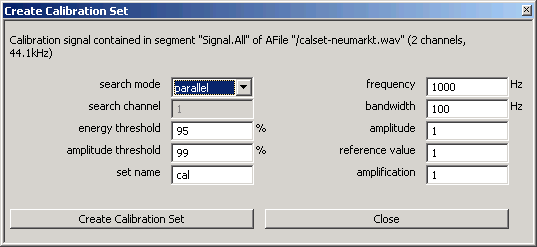Creating a calibration set
From STX Wiki
< User Guide | Project
You can create a calibration set in STx as follows:
- Open the sound file with the calibration signal in STx
- Select the
Signal.Allsegment in the Detail. - Select 'both automatic segmentation and extraction of calibration parameters' from the Workspace Special > Calibration > Create Calibration Set menu.
- Configure the calibration set.
Please note that calibration set creation can take a number of minutes.
Configuring a calibration set
Essentially, STx needs to calculate a 'calibration factor'. Once calculated, this factor can be associated with any sound files in STx and is used when those sound files are analysed and displayed. The following formula may help you understand the calibration calculations:
Where P is the signal amplitude displayed in STx, a is the mean amplitude of the calibration signal and r is the reference value.
STx then calculates the factor FK and uses this factor in all analysis operations with associated signals.
- search mode
- One of the following values:
- parallel - each calibration signal channel contains it's own calibration tone.
- serial - the calibration tones for each calibration signal channel were recorded serially on one specific channel (please specify which channel in the search channel).
- one - there is one calibration tone for all calibration signal channels (please specify which channel in the search channel).
- search channel
- The channel with the calibration signal. This can be in the range of
1-nChannels. - energy threshold
- The energy threshold of the calibration tone used to create the calibration segments. I.e. if you specify
95%, then when the spectrum energy in the specified frequency bandwidth is 95% of the energy of the whole spectrum, the spectrum is included in the calibration segment. - amplitude threshold
- The threshold in % below which the maximum amplitude values are discarded when calculating the mean amplitude peak. This is necessary to reduce calibration contamination through random signal fluctuations.
- set name
- The name to give to the calibration set. It is possible to calculate more than one calibration set (i.e. using different parameters) based on the same calibration signal.
- frequency
- The frequency of the calibration tone. Often this is 1000Hz. The default in STx is
1000. - bandwidth
- The bandwidth to use for the signal energy calculation (see energy threshold above). A value of 100Hz means +/- 50Hz around the specified frequency (frequency).
- amplitude
- The real amplitude in dB or linear:
- linear - e.g
20(a) - dB - e.g.
98dB (P) - reference value
- The reference amplitude. E.g. for SPL,
20e-6(20 mPa). (r) - amplification
- The signal amplification factor (linear or dB). This can be necessary if the signal was recorded using an amplifier. Normally this can be set to
0dBor1.
